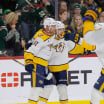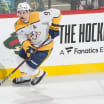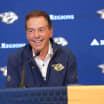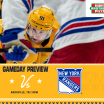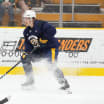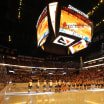Since July of 2004, one man has been responsible for keeping Nashville Predators players in top shape.
From in-season conditioning to offseason training, and even a bit of self-professed "day-to-day nutrition policing," David Good oversees what it takes to be physically prepared to excel in the top hockey league in the world.
As Nashville's strength and conditioning coach, he's seen it all over the past 18 seasons, and he wouldn't have it any other way.
Strength and Conditioning Coach Continues to Keep Preds in Top Shape
David Good, Nashville's Strength & Conditioning Coach Since 2004, Plays Large Role Behind the Scenes for Predators
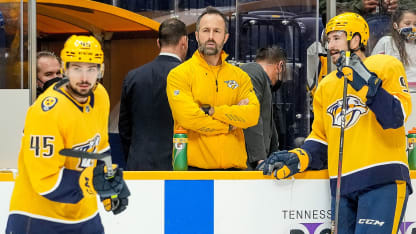
© John Russell
"I think an office job would drive me crazy," Good said on
a recent episode of the Preds Official Podcast
. "The travel schedule and the work schedule certainly demands a lot of us, but it's something you get used to… And you really end up enjoying it after a while. We've got such a tight-knit staff here that it's just a good sense of accomplishment when, as a group, you can battle through those days and a grueling travel schedule, and you come out the other end and you look at each other and say, 'You know what, as difficult as that was, it was really kind of a cool experience.'"
As is the case for anyone blessed to work the NHL circuit with a club, Good has had plenty of those experiences over the years, and like most, he got his start far away from the bright lights.
The Colorado native has worked his way up, serving as the Assistant Speed-Strength and Conditioning Coach for the Los Angeles Kings from 1999-03, and he held the same title from 1997-99 with the Long Beach Ice Dogs, then of the IHL. He also served as Strength and Conditioning Coordinator at Loyola Marymount University in Los Angeles from 1998-99.
Before moving to California, Good worked as the Student Assistant Strength and Conditioning coach at the University of Colorado for two years. He received his bachelor's degree in kinesiology from the University of Colorado Boulder along with certifications in strength and conditioning, sports conditioning, Olympic weightlifting and kettlebell training.
After suffering an injury as a collegiate hockey player, Good, who says he's always been a "gym rat," received an offer that eventually led him to Nashville all these years later.
"I happened to be working at a bar with a buddy that was working for the strength and conditioning department, and he said, 'Hey, do you want to come help us out as a student assistant?'" Good recalled. "It seemed like a pretty natural fit, and it was just kind of the right place at the right time to make that transition. So, ultimately looking back at it, I'm really happy that I kind of was forced to make that decision, I guess, but certainly I'm more at home in the gym training guys than in the training room taking care of injuries. So, I'm happy it worked out the way it did."
He took over in Nashville almost two decades ago, and with any line of work, parts of the role - and the way Good goes about his business - has changed over time.
"Things have really evolved," Good said. "From my area, the human body certainly hasn't changed much - anatomy is anatomy, physiology is physiology - there aren't a lot of secrets involved, but the way I try to evolve our program is to stick with the fundamentals that I believe in and know that work, but still try to make changes. And it's not necessarily every year, but you try to find new techniques, new implements, new devices that can help evolve your programs to get better, because if you're not continually trying to educate yourself and make your program better, then you're just being static and you're not going to improve yourself as a coach or the team."
The two areas with the most significant change over the years, Good says, are nutrition, and especially the utilization of biometric data.
Alongside Predators Team Nutritionist Mari-Etta Parrish, Good helps develop meal plans and modes of recovery with proper amounts of nutrients and hydration, aspects that have grown tremendously since the mid-2000s.
And then there's the technology.
"The biometrics area, which incorporates heart rates, workloads, electronic devices that catch those things - everybody knows things like the Apple Watch and the Whoop Band - and we use devices similar to that, but that are a little bit more scientific, a little bit more accurate," Good said. "So, we're really just starting to delve into that area as far as collecting data of practices and morning skates and seeing quantitatively what kind of workloads guys have with their heart rates and their bodies throughout the day, the week, the season. It's really an interesting area for me to continue in my education process, too."
That's all part of a day's work for Good, even though no two days in professional sports are exactly the same. There are certainly still routines to follow, however, especially on game days, and particularly on the road.
The alarm goes off early in time for a staff breakfast - usually with trainers and equipment managers - so they can all head to the respective arena in whichever city the Preds happen to be playing in that night. Good will arrive a few hours before the players get there around 10 a.m. or so to make sure everything is set up and ready to go prior to the morning skate.
The players are in the building for approximately two or three hours in the morning, and then they'll head back to the hotel for a pregame meal and nap ahead of puck drop that night. The downtime provides a chance for Good to grab some lunch and get in a workout - or maybe a nap for himself - anything to recharge before the players come back once more mid-to-late afternoon.
"From 3 or 4 o'clock on, it's just constant moving around, making sure the guys are ready for the game," Good said. "And then kind of the unique situation for me is when the game is going on, I will train our healthy scratches. So, the two or three guys that don't play that night will work out during the first period of the game, make sure that they are physically prepared to perform optimally for the next night or the next couple of days, making sure they get their workload in, too. Then once the game is over, we take care of some recovery and nutrition things, we pack up and we're on the plane to the next city, and then you unpack and you start over again."
The routine happens 41 times per season on the road - plus 41 more occasions at home - and then everyone hopes to do it at least a few more times in the postseason each year. But, at the very least, players, coaches and staff will spend 82 games - and at least six to seven full months with each other - a process that can become monotonous from time to time.
Therefore, it's important for Good to know how to get the most out of the players, and no two are exactly alike when it comes to effective motivational tactics. So, how does Good keep the Preds engaged day after day?
"I just sit there and yell at everybody," Good quipped. "No, we were required to take sports psychology classes for our education, so I do have some exposure to it. But the biggest thing you learn, especially at the professional level, is that each guy has to be handled differently. And some guys can handle the yelling, and here we have such a good group of guys, and it's all in good fun. There's never really any confrontation or animosity, so if there's any kind of loud noises coming from the weight room, it's always just a dry sense of humor back and forth with the players. But some guys can take that, other guys can't. Some guys really need to just kind of be led through a process step by step and shown a little bit more directly.
"So, that's a fun part of the job for me is learning about these guys, developing good, professional relationships with them and then knowing what makes each guy tick. I'm fortunate to have a lot of contact with each player every day, and the gym is usually the first place they end up, so you kind of get a read on them early in the morning if they've gotten good sleep, if they're a little bit tired. So, it's a fun part of the process."
That work in the gym is important for every player, and perhaps not surprisingly, Good says rookie forward Tanner Jeannot took the overall fitness award to start the season for his abilities in the weight room. Good enjoys witnessing how off-ice training translates to on-ice performance, and it's one of the more satisfying parts of the job when he helps a player find a plan that works for them to help them become an everyday NHLer.
And while Good isn't on the ice come game time, he certainly played an important role to help each of the 20 participants for the Preds get to that point in the first place. So, when the night is over and the Preds have collected two more points in the standings, Good is just as pleased as everyone else.
He's contributed to hundreds of victories over the past 18 seasons, and he'll keep doing in pursuit of the ultimate prize - just like those he trains.
"We all do this to win, and I think that sense of accomplishment when you win a big hockey game and the team plays well and you see how that boosts everybody up, you can look at each other and just go, 'All right, what we did today, we achieved our goals,'" Good said. "From a bigger picture, to go back to the 2017 Cup run, we were so focused on it and in the middle of it, I think we kind of lose sight of it sometimes. I would go out and run errands and go into Whole Foods and eight out of 10 people are wearing Preds stuff. Seeing the banners and seeing the support from the city, I think that's really the coolest thing is just kind of the effect we have on everybody's lives.
"I think we need to realize that a little bit more every once in a while, because we're in the trenches every day doing our job and doing it because we enjoy it and we love it, but to see the community and the city come together and support us is really amazing. It's fun to go out and talk to people, and when people find out what you do, you strike up a conversation. It's a really great city to have the support and enjoy giving them something that hopefully they enjoy to watch."

